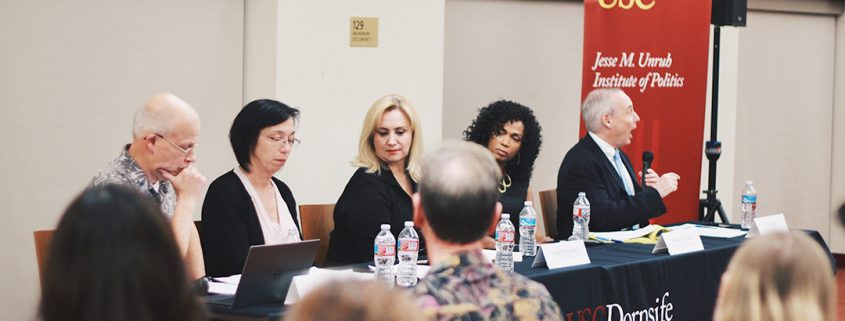Scholars analyze effect of unprecedented Trump win
More than 100 students gathered at the Ronald Tutor Campus Center to discuss the victory of Donald Trump in the presidential election and its impact on the future of the United States on Wednesday evening.
“What Comes Next,” co-hosted by the Jesse M. Unruh Institute of Politics and the Office of the Provost, was led by a panel of USC professors and faculty members who addressed some of the key issues witnessed during the election and highlight possible changes Americans can anticipate in the near future. The event aimed to enable faculty and students to collectively digest the outcome of the election in a respectful and safe environment. Panelists included Dan Schnur, the director of the Unruh Institute, Camille Gear-Rich, the associate provost for Faculty and Student Initiatives in the Social Sciences, Niels Frenzen, the director of the Immigration Clinic at the USC Gould School of Law and Clare Pastore, a law professor at USC.
Schnur stressed the importance of having students feel comfortable participating in the sensitive discourse and encouraged students to ask questions to the ideologically diverse panel members.
“While most of us are not in the position to sign or veto legislation in Washington, D.C., it seems to me that the real impact is not what happens in Washington, but what happens in neighborhoods, communities and campuses,” Schnur said. “Perhaps we really do have a vital role to play.”
Gear-Rich pointed out that though many USC students had voiced their concern and surprise over Trump’s victory, the discussion was created to offer guidance and reassurance to those who felt disillusioned by the outcome of the election.
“One of the most important things we can do tonight is to deal with the issues head on, think about issues in terms of their policy implications and look at the issues with a very sharp lens with careful way of talking to each other,” Gear-Rich said.
Students were reminded that the United States has faced controversial problems in the past and will continue to do so in the future. Schnur said, working together to find common ground was a priority for all Americans. More importantly, the panel emphasized how conversations similar to this one are necessary in order to bring different political and social outcomes in the future.
Furthermore, Schnur said that people should focus more on the actual policies and political agendas of U.S. politicians, rather than the personalities of the leaders.
“Although personality could be captivating, the role of public policy is worth our primary consideration,” Schnur said.
Frenzen discussed the fear many immigrant communities are currently experiencing due to Trump’s statements that he would deport undocumented immigrants living in the United States. He also voiced his concern over the possibility that Trump may eliminate the Deferred Action for Childhood Arrivals Act, which would leave the 700,000 people who were granted work permits under this provision at a disadvantage.
Frenzen also reminded the audience that nonviolent protests have previously had a tremendous and effective impact in U.S. policymaking. He used the 2006 L.A. immigration reform protests as an example, describing how half a million Americans gathered in the city to oppose the Border Protection, Antiterrorism and Illegal Immigration Control Act of 2005.
As the panel went on, one student expressed her concerns about the polarized nature of the media, while another asked about the problems America faces when it comes to using and generating renewable and nonrenewable energy. Some of the other issues brought up had to do with health care policy, the state of the environment and stock market prices.
The panel ended on an optimistic note, with Schnur stressing the advantages of technological improvements that enable people to communicate regardless of their socioeconomic and ideological background.
The panel agreed that technology empowers people to voice their ideas and live as open-minded individuals.
“Not only can we talk back to power, but more importantly, technology means that we can communicate horizontally with each other,” Schnur said.

